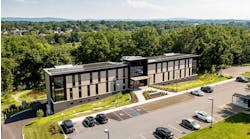ZGF joins First Movers Coalition to support emerging clean tech
Portland, Ore.–based architecture firm ZGF has joined the First Movers Coalition (FMC), a group of companies that pledge to use their purchasing power to support emerging clean technologies across eight sectors that have a heavy footprint on the environment. ZGF is the first architecture firm to join FMC.
As a signatory of FMC’s Cement and Concrete sector alongside companies such as General Motors, ZGF commits that at least 10% of the cement/concrete poured for its projects annually will meet or exceed the FMC’s definition for near-zero emissions by 2030, inclusive of any supplementary cementitious materials (SCMs). By 2035, ZGF will also exclude fossil-based SCMs, such as fly ash. Cement production is responsible for approximately 8% of global carbon dioxide emissions, a greater contribution than the aviation industry.
FMC launched the Cement & Concrete Sector last year at COP27 with targeted commitments for specifiers and purchasers of the ubiquitous construction material, including “encouraging the advancement and deployment of breakthrough manufacturing technologies and supply chain transparency that will be needed to deliver net-zero cement and concrete,” according to ZGF’s press release.
“ZGF has a long history of enabling market demand for innovative materials, including low-carbon concrete,” stated ZGF managing partner Ted Hyman in the release. “Joining First Movers and working together to accelerate the uptake of net-zero materials is an important next step in our mission to design a sustainable future.”
The architecture firm has a record of designing high-performance, low- or zero-carbon projects including the California Air Resources Board’s southern California headquarters in Riverside; the Clifford L. Allenby building in Sacramento, Calif.; and the PAE Living Building, which Smart Buildings Technology covered in detail last year.
ZGF is also a signatory of the COP26 Communiqué, initiated by the nonprofit organization Architecture 2030; signatories vow to use their agency to reduce carbon emissions and help the world meet the Paris Agreement’s objective to limit global warming to 1.5 degrees C above pre-industrial levels.
Led by the World Economic Forum and the U.S. government, the FMC comprises companies that pledge to use “their purchasing power to create early markets for innovative clean technologies across eight hard to abate sectors,” according to the organization’s website. These sectors include cement and concrete, aluminum, steel, and trucking, which are responsible for 30% of global emissions.
“Decarbonizing these sectors at the speed needed to keep the planet on a 1.5-degree pathway requires low-carbon technologies that are not yet competitive with current carbon-intensive solutions,” ZGF’s release states. “FMC members leverage their collective specification and purchasing power to scale up critical emerging technologies essential for the net-zero transition.”
For more news, projects, and profiles in the smart buildings ecosystem, subscribe to the SBT newsletter and follow us on LinkedIn, X, and Facebook.



